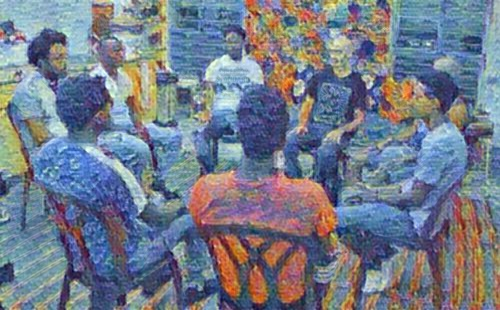I. HOW WILL ISRAEL RECOVER AND HEAL?
Unprecedented Collective Trauma. The tragedy and ongoing crisis of October 7, 2023 has affected every home and every resident of the country and, thereby, their families, friends and allies around the world. Millions of Israelis have experienced a collective trauma and loss, made worse by the ongoing war and existential threat and uncertainty.
A Mental Health Crisis. Consequently, a mental health crisis is fast emerging, with unprecedent incidence of PTSD, depression, anxiety, and suicidality, and their destructive consequences for Israeli families and children. It is estimated that this is the single largest public mental health crisis in the history of the State of Israel and among the Jewish community since the Holocaust.
Social Radicalization. Worse yet, we also know that human-made collective trauma, particularly when tied to a national, ethnic and religious conflict, will amplify social radicalization, polarization and inter-cultural conflict. These dynamics threaten the future stability of Israeli civil society and any hope for an inclusive shared society. Beyond the initial national humanitarian crisis, the longer-term process of recovery and healing must be addressed effectively.
The Treatment Gap. Unfortunately, the mental health workforce in Israel was very small, under-funded, and unable to effectively address the national mental health burden, even before the crisis. Consequently, an unprecedented number of people will need care, but will not be able to access it, when and where they need it. Resources and personnel are, rightfully, being triaged to acute trauma linked to October 7 atrocities and the many horrors of the ongoing war. Yet, it is critical that evidence-based mental health care can be offered not only to the thousands directly exposed, but also to the millions collectively exposed and struggling. There is a national imperative to develop a scalable portfolio of evidence-based therapeutic programs with reach and access across Israel, geared not only to acute mental health crisis responding, but also to the country’s collective recovery and rehabilitation. This is where we can be of help.
II. THE MOMENTS OF REFUGE PROJECT: HOPE IN INNOVATION
Our Mission. For over a decade, my group has conducted research to discover and develop therapeutic methods to promote recovery and healing among survivors of individual and collective trauma, loss, and existential uncertainty. Our work and findings led to the Moments of Refuge Project – a global social impact- and research- initiative to empower survivors of conflict, trauma and forced displacement, to heal and thrive. The initiative is a uniquely Israeli innovation – motivated by our ethical obligation to care for diverse communities locally and globally, who much like our own ancestors, now struggle with collective trauma, uncertainty and forced displacement. Thus, following the tragedy of October 7 and the war and uncertainty in its wake, we are now launching Moments of Refuge for Israel.
Mindfulness & Compassion as a Tool. There is strong evidence that to access our innate capacity to heal and recover from trauma and loss, we need to experience a subjective sense of refuge and safety within our lived experience. Objective safety is crucial, but not sufficient. This is why mindfulness- and compassion-based mental training is central to the Moments of Refuge mission and approach. Mindfulness meditation practices are designed to empower and enable people to experience moments of refuge and safety and, thereby, facilitate our innate capacity to adapt, to heal and to recover.
Moreover, in the past decade, a large scientific evidence-base has demonstrated the therapeutic stress-buffering effects of mindfulness and compassion training, therapeutic effects that are equivalent to much more intensive, costly and less scalable psychotherapeutic and pharmacological interventions. Our own randomized clinical trial research has documented that mindfulness- and compassion-based training is safe and effective, even among highly vulnerable trauma survivors facing adversity, injustice and uncertainty.
Finally, mindfulness training has broad reach and access, can be delivered to groups of participants and flexibly via digital platforms, is relatively low-cost, and its benefits can be sustained over time within and by communities. This scalability is critical to getting effective science-based care to those that need it, when and where they need it, even in complex and uncertain conflict-affected and post-displacement settings – much like Israel today.
Science as a Tool. Our approach to the implementation of Moments of Refuge is also unique because we use science as a tool to most effectively and responsibly implement our intervention programs. What this means, practically, is that we not only deliver therapeutic programs, but we use scientific monitoring and evaluation methods to ensure the ongoing intervention programs’ safety, therapeutic efficacy and impact, personalization of care, and ongoing therapeutic innovation and development. In the dynamic and unprecedented context of the mental health crisis in Israel post-October 7, we believe that our approach is now not only optimal clinically but is necessary ethically.
III. MOMENTS OF REFUGE FOR ISRAEL: OUR PLAN
National Reach Through a Hybrid Digital Platform + Group Support. The Moments of Refuge for Israel program will be delivered through our online digital mobile health program, in Hebrew, Arabic, and English. This self-guided digital health delivery format ensures broad reach and access, utilization flexibility, and geographic mobility for displaced Israelis, with an unlimited capacity for scaling-up. For Israelis who will be in need of greater support and clinical personalization, our digital mobile Mindfulness-SOS program will also be supported by community-embedded instructor-led groups, in-person or by zoom. This hybrid group-supported intervention delivery format also provides participants with greater access to connecting and recovering, together with a group of community peers. Groups will be led by trained and certified mindfulness instructors with clinical experience in trauma and mental health.
The Mindfulness-SOS Intervention Program. Mindfulness-SOS entails 8 brief training session modules and 10 complementary meditation practice exercises, that participants can flexibly access whenever and as frequently as they need. The hybrid in-person group-supported intervention format includes 4-8 (bi)weekly 60-90-minute sessions (10-15 participants/group), designed to support the Mindfulness-SOS digital training session modules and meditation practice exercises. The intervention program entails trauma-sensitive, formal and informal mindfulness meditation and compassion practices, supported by psychoeducation on stress and trauma (e.g. to normalize, de-stigmatize) and socio-culturally inclusive communication of intervention principles and practices to diverse communities.
IV. PHASED & PARTNER-BASED IMPLEMENTATION: THE NUTS & BOLTS
National Multi-Site Open-Trial. Aligned with our scientific approach to intervention program implementation, Mindfulness-SOS will be implemented through a 2-arm multi-site open clinical trial, among Hebrew- and Arabic-speaking adults. To do this, we will partner with a network of mindfulness instructors and mental health service organizations across Israel. To ensure effective national implementation, we are working closely with the Israel Collective Action for Resilience (ICAR) – a non-profit coordinating and supporting evidence-based mental health care in Israel post-October 7.
Phase I: Multi-Site Implementation and Data-Based Intervention Program Optimization. First, Phase I will offer the self-guided digital Mindfulness-SOS program to thousands of Israelis who do not need the more intensive instructor-led group support. Eligibility for access to the self-guided program will be determined based on clinical screening, to ensure safety and optimize potential for clinical effectiveness. Second, implementation of the hybrid group-supported intervention delivery format will initially entail 1-2 training workshops delivered to ~10 instructors, who will then implement the program in ~10 pilot sites across Israel. Prior to launching Phase II, we will quantitatively evaluate Phase I outcomes and conduct any needed data-based adaptation to the self-guided and/or hybrid group-supported intervention delivery formats (i.e. to optimize uptake, engagement, therapeutic effects).
Phase II. Scaling-Up Reach and Access. First, scaling-up of the self-guided digital Mindfulness-SOS program program will involve a snow-ball campaign recruiting Phase I program participants, establishment of a network Moments of Refuge for Israel community and municipal organizational partners, as well as a direct-to-user coordinated social media campaign. At Phase II, the self-guided digital program could feasibly reach tens of thousands of Israelis. Second, scaling-up of the hybrid group-supported intervention format will be facilitated via recruitment and training of 10-20 additional group instructors. At Phase II, the group-supported program capacity could reach and impact 600-900 participants every ~8-10 week cycle (i.e. 20-30 instructors, each delivering ~2-3 groups/week, to 10-15 participants/group). Scaling-up of implementation nationally will be coordinated with ICAR.
Monitoring and Evaluation: Impact Goals & Outcomes. Using our established digital measurement platform, we will systematically evaluate, quantify and optimize program delivery and its therapeutic impact on trauma- and stress-related mental health symptoms of program participants as well as on their family members and children; empirically identify individuals who need additional mental health care or other services; and thereby generate a novel therapeutic capacity as well as empirical evidence-base to share with mental health care providers in Israel and around the world. Evidence sharing will be coordinated with ICAR.
Outcome metrics include improved capacity to cope with the trauma and stress, reduced rates and severity of trauma- and stress-related symptoms (e.g. PTSD, depression, anxiety, suicidality), and thereby, improved family and child outcomes. By impacting thousands of Israelis, the program will also contribute to collective social resilience as well as help buffer social radicalization and polarization within their respective social networks and communities around the country.
V. BUDGET OVERVIEW
We are now seeking support to launch year one of our project ($500,000 target). Funding is needed primarily to support team personnel, including a national project coordinator, clinical care and training coordinator, community partnership coordinator, a programmer, intervention group leaders, monitoring and evaluation support staff, and logistical expenses. Additional personnel resources from our team, including from Prof. Amit Bernstein, will be provided in kind. An initial target of $175,000 will permit us to launch Phases I and II of the self-guided digital intervention program implementation. We foresee that Moments of Refuge for Israel will be needed, for at least, the next 3 years. If you are interested and would like to discuss how you may join and support us, please contact Professor Amit Bernstein: abernstein@psy.haifa.ac.il
Amit Bernstein
Professor, University of Haifa, School of Psychological Sciences
Visiting Professor, University of Wisconsin-Madison, Dept. of Psychology, Center for Healthy Minds
Director, Observing Minds Lab & The Moments of Refuge Project
Email: abernstein@psy.haifa.ac.il / USA Phone: +1-608-690-0154 / Israel Whatsapp: +972-54-263-4378
Professor Bernstein is the Director of the Observing Minds Lab and the Moments of Refuge Project, in the School of Psychological Sciences at the University of Haifa. Prof. Bernstein is an alumnus of the Israel Young Academy of the Israel National Academy of Sciences and Humanities and, currently, a Visiting Professor at the Center for Healthy Minds at the University of Wisconsin-Madison. With his students and colleagues, Prof. Bernstein has published over 160 scientific articles guided by a commitment to compassionate, rigorous and ambitious clinical science with a restorative social impact mission.
University of Haifa
The University of Haifa (UH) is the most diverse research institution of higher education in Israel. Home to more than 17,000 students (including IDF officers and security personnel) and faculty members from different ethnic, religious, and socioeconomic backgrounds, the University brings Jews, Muslims, Christians, Druze together in the pursuit of knowledge, to engage with each other in a local setting to solve global problems. UH serves as a model of tolerance and coexistence in Israel, strengthening society by expanding academic opportunities for all and building a new Israeli middle class. The university’s unique ecosystem - on the mountain, in the city, and by the sea – drives its innovative approaches to pressing global challenges.
American Society for the University of Haifa (ASUH)
ASUH is a U.S. nonprofit organization, whose mission is to showcase, celebrate, and raise funds for the programs of the University of Haifa in Israel, serving as a vital connection to the University of Haifa. Institutional partners, individual supporters, university alumni, and U.S. communities each benefit from strengthening relations between the U.S. and the University of Haifa.


